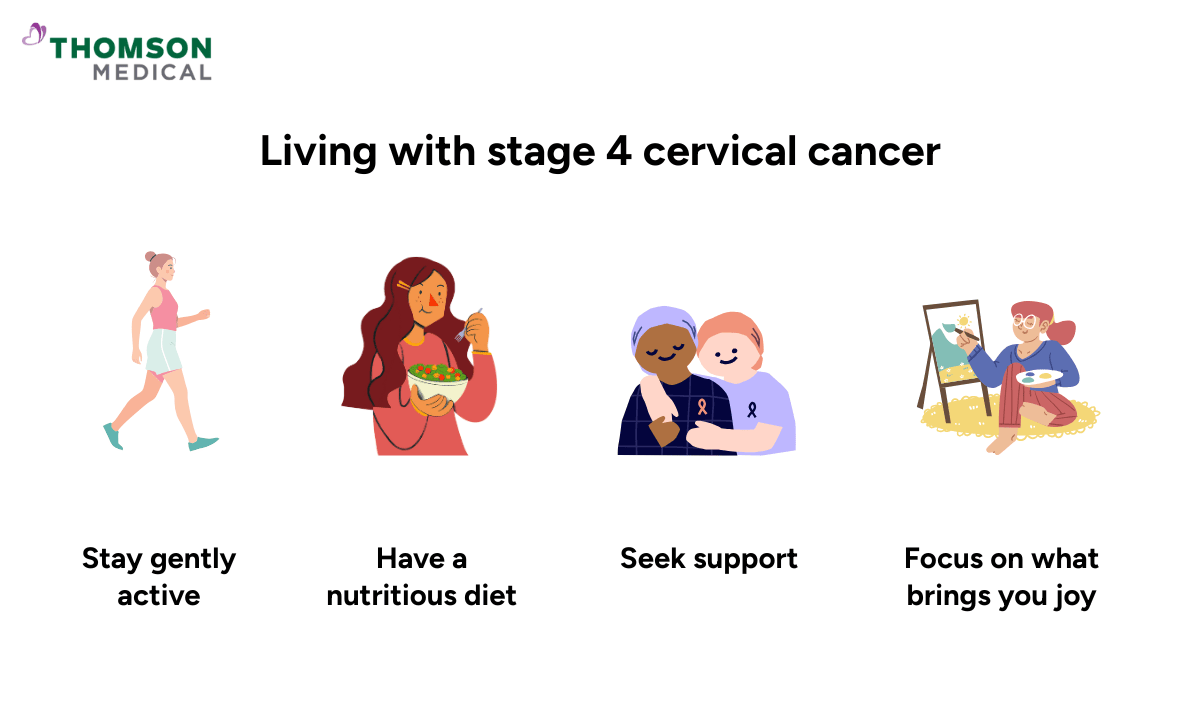Receiving a stage 4 cervical cancer diagnosis can leave anyone feeling overwhelmed, even numb. You might be thinking: “Can cervical cancer be cured in its fourth stage?”, “What are my options?”, or simply something that brings a bit of clarity to what you’re going through. It’s completely understandable to look for hope when the future feels uncertain.
Although the stage is challenging, seeking clarity about your treatment options, what to expect, and how to care for yourself is the first courageous step toward reclaiming control over your health journey.
What is cervical cancer?
Cervical cancer starts in the cervical cells of the cervix, the lower part of the uterus that connects to the vagina.
It is usually caused by persistent infection with high-risk types of the human papillomavirus (HPV). Over time, these HPV infections can lead to abnormal cell changes in your cervix, which can eventually develop into cancer if not detected and treated early.
While these changes are treatable in early stages, cervical cancer can become more serious when it progresses and spreads beyond the cervix.
What is the fourth stage of cervical cancer?
Cervical cancer grows gradually, and your doctor will classify it into stages based on how far it has spread.
In the earlier stages, the cancer remains within the cervix or nearby pelvic tissues. Stage 4 is the most advanced stage, where the cancer has spread beyond the pelvis.
Stage 4A:
Cancer has reached nearby organs such as the bladder or rectum.
Stage 4B:
Cancer has spread to distant organs like the lungs, liver, bones, or distant lymph nodes.
At this stage, treatment focuses on controlling the cancer’s growth, relieving symptoms, and improving quality of life.
Can cervical cancer be cured in its fourth stage?

This might be your biggest concern when facing a stage 4 cervical cancer diagnosis, and you deserve an honest answer.
Stage 4 cervical cancer is rarely curable. This means that your doctor cannot remove every cancer cell from your body at this stage because the cells have spread beyond areas where surgery or localised treatment can reach them.
However, this doesn’t mean you are out of options. Your doctor will shift the focus of your treatment at this stage. Instead of trying to cure the cancer completely, they will work to control the cancer’s growth, manage your symptoms, and help you improve the quality of your life.
Modern treatments are also becoming more advanced, allowing many women to live for years with a good quality of life.If you're facing a stage 4 cervical cancer diagnosis and have questions about what comes next, schedule an appointment with Thomson Medical. Our oncology specialists are here to help you understand your treatment options and create a care plan tailored to your needs.
Our women's cancer specialist
Loading...
Is stage 4 cervical cancer terminal?
Stage 4 cervical cancer is generally not curable, but it is not always immediately terminal. This means that while the cancer cannot typically be eliminated completely, treatments can control the disease, manage symptoms, and significantly extend life – sometimes for years.
Terminal doesn’t mean there’s nothing that can be done, and it doesn’t put a specific timeline on how long you have. Your doctor will always be by your side, adjusting treatment as needed to improve your outcomes.
Stage 4 cervical cancer prognosis and survival rates
The prognosis for cervical cancer is what your doctor expects about how the disease will progress, and it depends on several factors:
Your overall health before diagnosis
How your body responds to treatment
The specific characteristics of your cancer
Where the cancer has spread
It’s important to know that early-stage cervical cancer (stages 0-1) has better outcomes than stage 4, where the disease has spread further and becomes more challenging to treat. However, challenging doesn’t mean impossible, and every person’s journey is unique.
Cervical cancer survival rates
The 5-year survival rate for stage 4 cervical cancer falls between 15% and 25%. However, these statistics represent averages across many different situations. They don’t account for your specific circumstances, such as your age, your overall health, and the exact characteristics of your cancer.
Some women live much longer than five years with advanced cervical cancer, especially with effective management of the disease.
Your doctor can give you a more personalised understanding of your prognosis based on your specific situation. However, the numbers only provide context, they don't define your journey.
Stage 4 cervical cancer treatment options
Treatment for stage 4 cervical cancer usually involves a combination of approaches, tailored to where your cancer has spread and how your body is responding.
Your doctor will work with you to create a personalised treatment plan, which can include:
Chemotherapy:
Chemotherapy uses drugs to kill cancer cells throughout your body or stop them from growing
Because chemotherapy affects both cancer cells and some healthy cells in your body, it can cause side effects. You might experience nausea, fatigue, or hair loss. Your immune system may also become temporarily weakened.
Your doctor will prescribe medications to help manage many of these side effects and will monitor you closely throughout treatment.
Radiation Therapy:
Radiation therapy uses focused, high-energy rays to kill or shrink tumours.
Your doctor may combine radiation with chemotherapy to treat advanced cervical cancer, especially if the cancer is confined to the pelvic region or has spread to nearby organs.
Targeted Therapy:
Your doctor might suggest targeted drug treatment when other treatments haven’t worked as expected.
This method involves drugs that specifically target cancer cells without harming normal, healthy cells, and it may help slow cancer progression or reduce symptoms.
Immunotherapy:
It may be used if your cancer doesn’t respond well to traditional treatments.
Immunotherapy uses drugs, such as checkpoint inhibitors, to help the immune system recognise and destroy cancer cells.
These options can feel overwhelming, but you don’t need to understand everything right away. Your doctor will walk you through each option, explaining what to expect and helping you decide what’s right for your situation.
Living with stage 4 cervical cancer

Living with stage 4 cervical cancer comes with challenges, but these small tips can help you feel more in control:
Stay gently active:
Short walks or light stretching can boost your energy and mood. However, be sure to discuss with your doctor what level of activity is safe for you.
Have a nutritious diet:
Protein and calories are crucial to help your body handle treatment and heal. It’s best to consult a nutritionist for more advice.
Seek support:
Consider talking to a counsellor who specialises in cancer care or joining a support group. Sometimes, being around people who truly understand can be comforting.
Focus on what brings you joy:
Making space for your interests, working on a hobby, or spending time with your loved ones can bring you meaning and joy.
Your doctor will be your partner in this journey. If something feels off or you’re struggling with any aspect of your care, they’re here to support you every step of the way.
Advanced cervical cancer can feel overwhelming, but we are here to provide treatment options that support you during this trying time. If you would like to explore available treatments, request an appointment with our women’s cancer specialists at Thomson Medical.
FAQ
What is the cause of death in cervical cancer patients?
In advanced cervical cancer, death usually results from complications related to the cancer’s spread rather than the tumour itself. When cancer spreads to vital organs, it can interfere with their function, which makes it harder to treat.
What is the best food to eat when having chemo?
During chemotherapy, eating foods that are gentle on the stomach and provide essential nutrients is key. Your doctor may recommend high-protein, high-calorie foods, such as lean meats, eggs, nuts, dairy products, and smoothies, as part of a balanced diet. It’s also important to avoid spicy, greasy, or hard-to-digest foods.
What is the difference between stage 4A and 4B cervical cancer?
Stage-4 cervical cancer is divided into two categories based on where it has spread:
Stage 4A:
The cancer has spread to nearby organs, like the bladder or rectum within the pelvic region.
Stage 4B:
The cancer has travelled to distant organs like the lungs, liver, or bones.
Your doctor will use imaging tests like CT scans, MRIs, or PET scans during staging evaluation to determine exactly where the cancer has spread and whether you have stage 4A or 4B disease. This information will help them recommend the right treatment approach for you.
When do oncologists stop treatment?
Oncologists will consider stopping treatment in several situations when:
The cancer is no longer responding to therapy
The side effects of treatment become too severe
Your quality of life is significantly impacted
The decision is always made together with you. Your doctor will be by your side and support you along the journey.
What are the early signs of cervical cancer?
Early cervical cancer may have no noticeable symptoms. This is why regular cervical cancer screening with Pap tests (also called Pap smears), HPV tests, and pelvic examinations is so crucial, because it can help find precancerous changes before the cancer even develops.
However, when symptoms do appear, the most common early warning signs include:
Abnormal vaginal bleeding
What virus causes cervical cancer?
The human papillomavirus (HPV), especially certain high-risk strains such as HPV types 16 and 18, is the leading cause of cervical cancer.
HPV is a sexually transmitted infection (STI) that spreads through sexual contact. Having multiple sexual partners can be a risk factor for HPV infection.
HPV causes changes to the cells in the cervix, which may eventually lead to cancer if left untreated. The good news is that HPV vaccines can help protect against the most dangerous strains of HPV.
The information provided is intended for general guidance only and should not be considered medical advice. For personalised recommendations and tailored advice based on your unique situation, please consult a specialist at Thomson Medical. Schedule an appointment with Thomson Medical today.
For more information, contact us:
Thomson Specialists (Women's Health)
Thomson Women's Clinic (TWC)
- Novena:
6592 6686 (Call), 8611 8986 (WA) - Bukit Batok:
6569 0668 (Call), 8686 3525 (WA) - Choa Chu Kang:
6893 1227 (Call), 8282 1796 (WA) Jurong:
6262 8588 (Call), 6262 8588 (WA)- Katong (female doctor):
6970 2272 (Call), 8611 9020 (WA) - Punggol:
6243 6843 (Call), 8811 0328 (WA) - Sembawang: 6753 5228
- Sengkang: 6388 8125
- Serangoon (female doctor): 6382 3313
- Tampines: 6857 6266
- Tiong Bahru: 6276 1525
